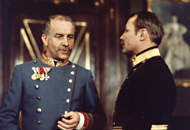Steven King's inspiration?
For Hofmannshal the goal of his writing dealt directly with his notion of ‘pre-existence.’ According to Janik and Toulmin Hofmannsthal’s notion of ‘pre-existence’ was defined in terms of the state that all souls and minds existed together as one with everything in the universe. Throughout his stories and poems, Hofmannshal grappled with the sense of unity between the individual and their associations with the world. In my mind, this notion got really interesting in the descriptions of eyes in Tale of the 672nd Night. How better to describe the merchant’s son’s associations with the rest of the world than with vivid, creepy, and dreamlike descriptions?
Example one, the fifteen year old girl. The merchant’s son admits that he was only comfortable looking at her when he saw that her eyes were closed. He seems to associate his reality with how he senses those around him are judging him. Here, the fact that the girl’s eyes were closed mean that she would be unable to judge him- and he would be free to decipher his own sense of reality. When she finally opens her eyes he describes her expression as “with stony spite.” At this moment the merchant’s son is given a dose of reality, and that reality is that this girl really seems to loath him.
Example two, the child he encounters near the greenhouse. Ironically this little girl reminded the merchant son of the fifteen year old living in his house. He described the way she look at him as “malignant,” and confessed a fear of turning around knowing that she could still be starring at him. He describes her eyes as “flickering with fury and hate.” Again, the merchant’s son notion of reality is directly connected with how he feels those around him are judging him. In this instance this small child seems to hate him more than the fifteen year old, and as such he describes this greenhouse experience like it was something out of a Steven King novel. The way he described her I was expecting her to turn into a demon, and for blood to start rushing down the greenhouse walls. As far as I am concerned, all of his fears about his reality were centered upon the look in this child’s eyes.
So, in closing, in this story the merchant’s son does not seem to exist very nicely with the rest of the universe. The merchant’s son gauged his sense of reality based on what he conceived others to think of him. The merchant’s son perceived his reality as judgmental, harsh, and creepy. No wonder he stayed so introverted in his own little microcosm of a house. I’d want to create my own little world too if I lived my life basing what I thought about myself based on what I conceived others to think of me.



1 comment:
You have arrived at something in your comment that I couldn't quite get to; the eyes that look at him (or refuse to) are hateful or void, yet he believes he has created a beautiful life for himself. Is the world outside his garden wall and home indifferent to his aesthetic world? Is he destroyed by ugliness because the aesthete changes nothing externally when he constructs/understands beauty?
Post a Comment